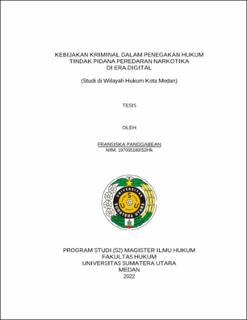Kebijakan Kriminal dalam Penegakan Hukum Tindak Pidana Peredaran Narkotika di Era Digital (Studi di Wilayah Hukum Kota Medan)
Criminal Policy in Law Enforcement of Criminal Acts of Drug Circulation in The Digital Era (Study in Jurisdiction of Medan City’s)

Date
2022Author
Panggabean, Fransiska
Advisor(s)
Ediwarman
Sunarmi
Marlina
Metadata
Show full item recordAbstract
The legal issues in this study are related to the criminal policy of law enforcement for
narcotics trafficking in the digital era of study in the legal area of Medan City. One of them is if the
proof process is carried out with legal defects (violating legal procedures), then the evidence obtained
will also be legally flawed, so it cannot be used as legal evidence before the trial. The process of
proving narcotics trafficking cases is related to the due process of law. This study wants to see how the
criminal policy of law enforcement for narcotics illicit trafficking in the digital era in the jurisdiction
of Medan City. The problem is, how are the legal rules that regulate criminal policies for narcotics
trafficking in the digital era in the jurisdiction of Medan City, the factors that influence law
enforcement, and how are criminal policies towards law enforcement of narcotics trafficking crimes in
the digital era.
This research is normative legal research and descriptive analysis. Methods of statute
approach and conceptual approach. Document study and interview data collection tools. The
procedure for collecting and collecting data uses library and field study techniques. Data analysis
used qualitative methods.
The results of the study: 1) The law governing the criminal policy of narcotics trafficking in
the digital era of study in the jurisdiction of Medan City has provided penal and non-penal means for
Law Enforcement Officials to enforce Law no. 35 of 20009 concerning Narcotics using Technology,
Information, and Telecommunications instruments, starting from: investigations and investigations
based on the Criminal Procedure Code, Law no. 2 of 2002 concerning the National Police, and the
Regulation of the National Police Chief No. 6 of 2019 concerning Criminal Investigations; the
expansion of legal evidence is contained in Law no. 11 of 2008 jo. Law No. 19 of 2016 concerning
Information and Electronic Transactions; the prosecution law is contained in Law no. 16 of 2004
concerning the Attorney General's Office and Regulation of the Attorney General of the Republic of
Indonesia No. Per-036/A/JA/09/2011 concerning Standard Operating Procedures for Handling
Criminal Cases; the rules of administrative law and the trial of criminal cases in court electronically
are regulated based on the Regulation of the Supreme Court of the Republic of Indonesia No. 4 of
2020; 2) Basically the most influencing factor is the legal culture factor, because there is a stigma in
law enforcement for narcotics crime, that everyone suspected of being a dealer or dealer, always seeks
the lightest punishment and fast legal process. However, if the perpetrator is a narcotics user/abuse, it
is certain that there are "unscrupulous" law enforcement officers who want the user to be subject to
criminal sanctions as a dealer; 3) Law enforcement efforts in the context of penal policies carried out
by law enforcement officials are still not sufficient to eradicate narcotics trafficking in the digital era.
Because, along with the development of Technology, Information, and Communication, the modes of
drug trafficking are also growing rapidly. Suggestion, with the support of the Law on Information and
Electronic Transactions regarding electronic evidence, can be an extension of legal evidence, Law
Enforcement Officials should be able to use these instruments in uncovering criminal cases to make
them easier to prove.
Collections
- Master Theses [1849]
